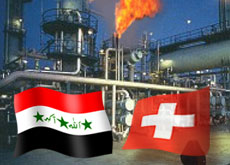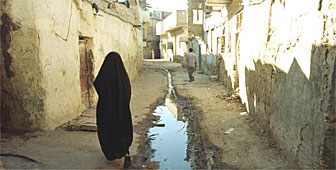Swiss take stock of oil needs as war looms

Switzerland is well placed to weather an oil crisis caused by a short war in Iraq - the country has enough stocks to last four months.
But the chairman of the Central Bank, Jean-Pierre Roth, warned on Tuesday that war could push up the value of the franc, leading to a risk of deflation.
Speaking in Geneva, Roth said the Swiss “currency could come under pressure in the case of large geopolitical instability” caused by a war in Iraq.
He added that the Central Bank still had a “certain margin of manoeuvre” to cut interest rates – already at very low levels – and would do so should the franc be pushed higher by “illogical market reaction”.
The Swiss currency has shot up by 20 per cent compared with the dollar since the start of 2002, but has remained steady against the euro.
Roth warned that any further appreciation could lead to deflation. “In the case of a shock of this nature, we would use all the necessary defensive measures – not excluding intervention,” he said.
He ruled out pegging the franc to the Euro, though, saying this would lead to a massive rise in interest rates, damaging Swiss competitiveness.
Higher prices
The effect of a possible rise in the oil price is not expected to hit Switzerland unduly hard, provided it is temporary.
The director of the Swiss Oil Association in Zurich, Rolf Hartl, told swissinfo that the country has sufficient stocks to cover demand for about four months for heating oil and petrol, and three months for jet fuel.
“We have more compulsory stocks than the rest of the industrialised countries because the international standard is 90 days,” he said.
He commented that Switzerland historically kept larger oil reserves than other European countries or the United States.
“It has something to do with the typical Swiss belief in insurance. In the last decades we had even more compulsory stocks because we also had the scenario of the Cold War.
“Stocks ten or 15 years ago covered demand for about one year,” he added.
Hartl said that after any announcement of conflict, he expected prices to rise significantly.
“I believe… prices will increase sharply and the price will depend on how the conflict develops and how long the war will last.
“I don’t really believe there will be a physical shortage of oil because Iraq supplies only two million barrels a day. The world produces 75 million per day so the significance of Iraqi oil imports is not very high,” he said.
However, he warned that a worst-case scenario would be if conflict spreads to neighbouring countries.
About a third of Switzerland’s oil needs is covered by the import of crude from Libya, Nigeria and Algeria. The remainder are imports of oil products from European countries. The country has no direct imports from Iraq.
Consequences
“The consequences for the oil market would be severe because the whole Middle East region represents about a third of the worldwide crude production,” he commented.
“The best-case scenario from the economic and oil point of view would be a short war in Iraq and a new government which would be reliable and in which the markets would have confidence,” he said.
As far as the effects on the Swiss economy are concerned, study at the KOF economics research institute at the Federal Institute of Technology in Zurich in December tried to give some indication.
Assuming that the price of crude oil rose to $40 dollars a barrel in the first quarter before falling to $27.60 at the end, the average price for 2003 would be $36.
Asked whether oil from Iraq found its way into Switzerland from European finished products, Hartl said this was difficult to answer.
“We don’t know that because statistically these are imports out of European countries but we know that European crude demand is covered 15-20 per cent by imports from the Middle East,” he said.
Economic fallout
KOF researcher, Erdal Atukeren, commented that a hefty rise in the oil price and the consequent slowing down of global economic activity would probably have only a limited drag on Swiss economic growth.
Atukeren believes GDP would fall by 0.1 per cent in 2003 and 0.3 per cent in 2004. The stronger effect in 2004 would come as a result of delayed reaction on the part of individual economic sectors.
Although Switzerland imported nothing from Iraq in 2002, the figures show that there is an increasing interest among Swiss business in selling goods to Baghdad.
Exports to Iraq
Despite the United Nations embargo, Swiss firms exported goods worth SFr123.8 million last year, some 66 per cent up on the value of exports in 2001.
“These are mostly humanitarian goods [under the UN Oil for Food Programme] but since mid-2002 we have also been able to export other goods, with the exception of war material and dual-use goods which can be used in the production of war material,” Othmar Wyss, responsible for export controls and sanctions at the Swiss State Secretariat for the Economy (Seco) told swissinfo.
The humanitarian goods include medicines and food, but also flour mills and pumps for hospitals (see related story “Swiss traders take long road to Baghdad”).
No control
Wyss said that Switzerland has no control of how the goods are distributed once they reach Iraq.
“We would like the humanitarian goods we export to be distributed to the people who need them but we really can’t do anything about that,” he said.
Inevitably perhaps, there are companies which try to break the UN embargo to do business with Iraq.
“Some companies and individuals imported Iraqi dinars illegally into Switzerland. We’re also investigating an illegal payment to Iraq,” Wyss commented.
“We really don’t know if some exports to Iraq’s neighbours like Jordan and Turkey found their way Iraq,” he added.
If an individual or company breaks the UN embargo, there is a risk of imprisonment of up to five years and a fine of up to SFr1 million in serious cases.
War material exports
Swiss exports of war material are slightly on the increase but Switzerland does not permit exports to countries at war.
“They went up in 2002 by 7.6 per cent compared with 2001 and reached SFr278 million. It’s practically half the amount recorded in 1987 when we had the highest amount of SFr580 million,” Wyss said.
He added that it was difficult to prevent the exports of war material passing through third countries before arriving in Iraq.
“The Federal Police Office controls the export of war material until it arrives in the purchasing country. More we can’t really do because if the country then wants to re-export the war material, it would be difficult to detect.”
swissinfo, Robert Brookes
Switzerland imported 13,687,132 tons of oil and oil products in 2001.
Crude oil accounts for about a third of the imports.
Most of Switzerland’s crude oil comes from Libya (48.7 per cent), Nigeria (31.9 per cent) and Algeria (9.7 per cent).
Almost all finished oil products (99.2 per cent) are imported from European Union countries.
In 2002, Switzerland had no imports from Iraq but it exported mainly humanitarian goods valued at SFr123.8 million, up 66 per cent over the previous year.
Exports of war material from Switzerland in 2002 were valued at SFr278 million.

In compliance with the JTI standards
More: SWI swissinfo.ch certified by the Journalism Trust Initiative


You can find an overview of ongoing debates with our journalists here. Please join us!
If you want to start a conversation about a topic raised in this article or want to report factual errors, email us at english@swissinfo.ch.